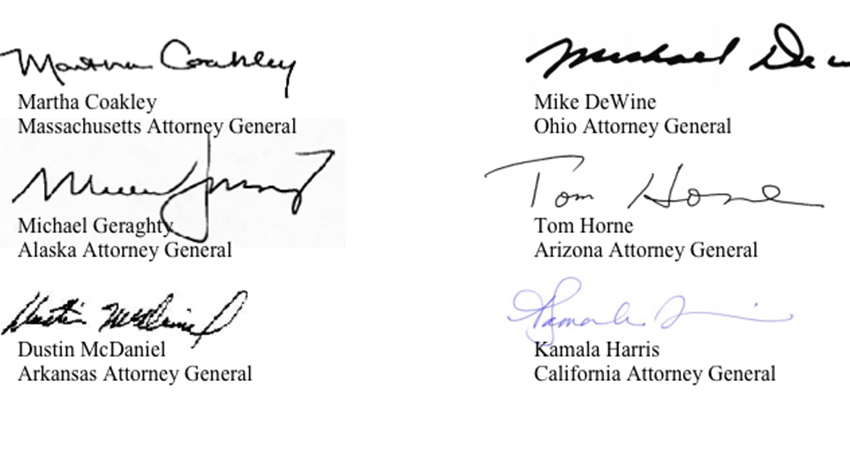State Attorney Generals Ask FDA To Regulate E-Cigarettes

A few of the 40 signatures. For the full document, click here.
A bi-partisan letter co-sponsored by Massachusetts Attorney General Martha Coakley was signed by 39 other state AGs urging the FDA to include e-cigarettes as “tobacco products” under the Tobacco Control Act. E-cigarette use is growing rapidly in the Greater Boston area and across the country. According to a recent Globe report, permit application requests to sell e-cigarettes are five times greater than last year.
The FDA does not regulate e-cigarettes for contents or age restrictions, and since the electronic devices produce a nicotine-laced vapor, it’s surrounded in controversy. The FDA website states, “As the safety and efficacy of e-cigarettes have not been fully studied, consumers of e-cigarette products currently have no way of knowing: whether e-cigarettes are safe for their intended use; how much nicotine or other potentially harmful chemicals are being inhaled during use; and if there are any benefits associated with using these products.” Additionally, the FDA says that e-cigarettes can potentially hook young people to nicotine and lead them to conventional cigarettes, which are known to cause disease and lead to premature death.
The letter highlights the need to protect youth from becoming addicted to nicotine through these new products. If e-cigarettes are not being marketed to children (like many e-cig companies claim), then why do the devices come in strawberry or bubble gum flavors? Do you know any adults that are going to buy a candy colored e-cigarette that tastes like peaches? I don’t.
“People, especially kids, are being led to believe that e-cigarettes are a safe alternative, but they are highly addictive and can deliver strong doses of nicotine,” AG Coakley says in a press release. “We urge the FDA to act quickly to ensure that these products are regulated to protect the public, and are no longer advertised or sold to youth.”
According to the Center for Disease Control and Prevention, from 2011 to 2012, the percentages of youth who have tried or currently use e-cigarettes both roughly doubled. The survey estimates that nearly 1.8 million middle and high school students have either tried e-cigarettes or used them on a regular basis. How do you spark a dying tobacco industry? Get kids hooked on nicotine through e-cigs. Then when it turns out to be a passing fad, the new addicts will have no where to turn except for traditional cigarettes. Brilliant!
According to a press release issued by the office of AG Martha Coakley:
According to the U.S. Surgeon General, nicotine is highly addictive and has immediate bio-chemical effects on the brain and body at any dosage, and is toxic in high doses. The lack of regulation of e-cigarettes may put youth at risk of developing a lifelong addiction to a potentially dangerous product that could also act as a gateway to using other tobacco products.
Additionally, some e-cigarette marketing suggests that these products do not contain the same level of toxins and carcinogens found in traditional cigarettes, cigars, and other tobacco products. These claims imply that e-cigarettes are a safe alternative to smoking, when in fact nicotine is highly addictive, the health effects of e-cigarettes have not been adequately studied, and the ingredients are not regulated and may still contain carcinogens. The lack of regulation may put the public at risk because users of e-cigarettes are inhaling unknown chemicals with unknown effects.
The other states joining the letter to the FDA, cosponsored by Massachusetts and Ohio, include Alaska, Arizona, Arkansas, California, Colorado, Connecticut, Delaware, Guam, Hawaii, Idaho, Illinois, Indiana, Iowa, Kentucky, Louisiana, Maine, Maryland, Michigan, Minnesota, Mississippi, Missouri, Montana, Nevada, New Hampshire, New Mexico, New York, North Carolina, Oregon, Pennsylvania, Puerto Rico, Rhode Island, South Dakota, Tennessee, Utah, Vermont, Virgin Islands, Washington, and Wyoming.


